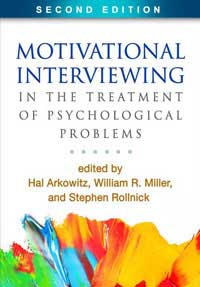 400 pages
400 pages10 CE credits
Course Enrollment
$220.00
Add to Cart
All exams are taken online. The exam for this course will be available in "My Courses" immediately upon enrollment. Note the book is not included.
The book is available for purchase from Amazon.
As an Amazon Associate we receive a rebate from qualifying purchases.
MOTIVATIONAL INTERVIEWING IN THE TREATMENT OF PSYCHOLOGICAL PROBLEMS, 2nd Edition
Hal Arkowitz, Ph.D., Henny A. Westra, Ph.D., William R. Miller, Ph.D. and Stephen P. Rollnick, Ph.D. (editors)Guilford Press, 2015
DESCRIPTION
This authoritative guide, now significantly revised and expanded, has given tens of thousands of clinicians proven tools for helping clients resolve ambivalence and mobilize their energy, commitment, and personal resources for change. Leading experts describe ways to combine motivational interviewing (MI) with other treatments for a wide range of psychological problems, including depression, anxiety disorders, eating disorders, posttraumatic stress disorder, and others. Chapters illustrate the nuts and bolts of intervention, using vivid clinical examples, and review the empirical evidence base. Contributors show how to tailor MI to each population's needs, whether used as a pretreatment or throughout the course of therapy.
This book is in the Applications of Motivational Interviewing series, edited by Stephen Rollnick, William R. Miller, and Theresa B. Moyers.
New to This Edition
• Many new authors.
• Extensively revised with the latest theory, practices, and research.
• Chapters on domestic violence, addictions, and smoking cessation with adolescents.
• Chapter on transdiagnostic treatment.
The reader will be able to:
• Explain the rationale for clinical applications of motivational interviewing (MI) for treating anxiety
• Recognize symptoms of PTSD and apply evidence-based MI treatments
• Identify the principal MI strategies for treating patients with clinical obsessive-compulsive disorder (OCD)
• Analyze using MI in depression treatments, and assess its use in tandem with CBT and other treatments
• Define suicidality as a motivational issue and, thereby, being a condition where MI practices can be applied
• Discuss engaging, evoking, focusing and planning features of MI to treat eating disorders
• Review DSM on pathological gambling and develop an MI treatment format for treatment
• Cite some common problems with medication nonadherence in schizophrenia and be able to determine the use of MI for treatment
• Define dually diagnosed patients and MI treatment protocols for this group
• Explore MI's use in other contexts, such as the correctional system, intimate partner violence, and the transdiagnostic treatment of emotional disorders
AUTHOR
Hal Arkowitz, Ph.D., is with the Department of Psychology, University of Arizona, Tucson, AZ.
William R. Miller, Ph.D., is with the Department of Psychology, University of New Mexico, Albuquerque, NM.
Stephen P. Rollnick, Ph.D., is with Department of General Practice, Cardiff University School of Medicine, Cardiff, UK.
"Simply the best current and comprehensive work in this area. I truly enjoyed reading--and learned from--this volume. Key contributors cover conceptual bases, research, and application issues with equal assurance. This book should be on the shelf of every clinician interested in MI, as well as graduate students and trainees."
--Keith S. Dobson, PhD, Department of Psychology, University of Calgary, Canada
"The second edition reflects contemporary advances in the practice of MI, as well as the solid science supporting its efficacy across a wide range of clinical problems. The contributors are outstanding practitioner-researchers. This is an excellent text for graduate courses aimed at conveying skills in research-supported psychotherapies, as is increasingly being mandated by professional guidelines. I highly recommend this book for graduate students and established practitioners alike."
--Bruce A. Thyer, PhD, LCSW, BCBA-D, College of Social Work, Florida State University
"Reading this second edition has enhanced my motivation to learn more and teach more about this important, effective, and pragmatic approach. I will never again be 'stuck' in a psychotherapy impasse without thinking about using MI principles. The editors and contributors emphasize both the spirit and the technique of MI and apply it to treatment of specific symptoms and disorders. The book is of great value to novice and seasoned practitioners alike, and is an outstanding classroom text."
--Richard F. Summers, MD, Co-Director of Residency Training, Department of Psychiatry, Perelman School of Medicine of the University of Pennsylvania
"This beautifully written book is full of wisdom about helping people change. With engrossing clinical illustrations and great practical tips, it will be a first-line resource for clinicians who want to build their skills in MI."
--Jesse H. Wright, MD, PhD, Director, University of Louisville Depression Center
"The book guides readers on how to incorporate motivational interviewing techniques in their clinical practice, summarizes current research on the wide-ranging application of motivational interviewing, and highlights new and promising directions....The editors and authors have offered a volume that is likely to do what they do best: motivate the field to examine important questions in the service of helping clients for change."
--American Journal of Psychiatry (on the first edition)
ISHK CE at Home
1702-L Meridian Ave., #266
San Jose, CA 95125-5586
This website uses cookies to ensure you get the best experience on our website. Learn more
